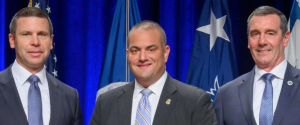The saga involving Dr. Alexander Eastman, the acting chief medical officer for U.S. Customs and Border Protection (CBP), is replete with allegations ranging from the bizarre to the downright serious. A whistleblower report, spotlighting a litany of accusations, sheds light on Eastman’s alleged misconduct, which includes a peculiar affinity for fentanyl lollipops, questionable travel practices, and falsification of federal contracts.

The most startling revelation from the report revolves around Eastman’s purported manipulation of agency rules to facilitate the transportation of fentanyl lollipops. During the UN General Assembly meeting in New York, Eastman allegedly orchestrated a plan to bring these potent narcotic painkillers aboard a helicopter, under the guise of assisting CBP agents with security efforts. Despite objections grounded in agency policies, Eastman purportedly crafted his own policy to justify his actions, raising serious ethical and safety concerns.
Moreover, whistleblowers have accused Eastman of misusing government funds for personal travel, including trips to Orlando, San Diego, and Phoenix, which were ostensibly unrelated to his official duties. These allegations suggest a pattern of extravagance and misuse of taxpayer dollars for personal gain. Additionally, Eastman is accused of improperly hiring consultants as part of an add-on to an unrelated contract, providing them with insider information to gain an unfair advantage in bidding on a new electronic medical records system contract.
Eastman’s background adds a layer of complexity to the unfolding controversy. Prior to his role at CBP, he served as head of trauma surgery at Parkland Memorial Hospital during a tumultuous period marred by billing fraud and safety lapses. His tenure at the Dallas Police Department, albeit in an unpaid volunteer capacity, raises questions about potential conflicts of interest and the extent of his involvement in law enforcement activities.
Furthermore, Eastman’s association with UT Southwestern Medical Center, a key player in the Parkland scandal, underscores the interconnectedness of these issues. Although he was not publicly implicated in the billing fraud case, his proximity to the controversy raises concerns about his judgment and ethical standards.
In response to the allegations, CBP has referred the case to its office of professional responsibility, signaling a willingness to investigate the matter further. However, Eastman’s continued presence in his position raises questions about the agency’s commitment to accountability and transparency.
As the controversy surrounding Dr. Alexander Eastman continues to unfold, it underscores the importance of robust oversight and accountability mechanisms within government agencies. The outcome of this investigation will not only determine Eastman’s fate but also shape perceptions of CBP’s integrity and commitment to upholding ethical standards.

